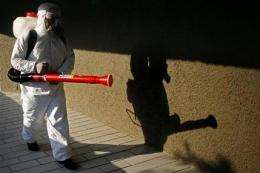Millions of kids begin returning to Mexico schools

(AP) -- As if marshaling for war, Mexico's government mobilized thousands of education officials and parents across the country to swiftly disinfect schools and monitor millions of returning students for signs of swine flu.
High schools and universities open Thursday after a two-week closure intended to curb the spread of the virus. Younger children were ordered back to class on Monday.
Secretary of Public Education Alonso Lujambio called on Mexicans to show "strength of spirit," trying to assuage worries that it's too early to reopen schools after the flu outbreak that killed 42 people in Mexico and sickened more than 1,100.
Parents expressed relief that their children, shuttered too long in homes, could return to class. But they also worried that the virus could surge back once 40 million young people gather in groups again.
"My 17-year-old daughter is afraid. She knows she must go back but doesn't want to," said Silvia Mendez as she led her 4-year-old son, Enrique, down a narrow street in San Miguel Topilejo, a town perched in forested mountains near the capital.
Mendez and her son wore masks as they walked to the tiny roasted chicken restaurant she owns. Enrique spoke adoringly of his teacher and seemed impatient to get back to kindergarten.
Working parents have struggled to provide child care during the shutdown. It forced many to stay home from work, bring their youngsters to their jobs, or leave them at home.
Isabel Garcia had to leave her 11-year-old son, Charlie, behind while she sold vegetables below a red-domed church in San Miguel Topilejo's central plaza.
"I'm nervous about him going back to school on Monday. But he will wear a mask and I have instructed him to stay away from any children who appear sick," Garcia said as customers squeezed past her stall, a colorful tableau of radishes, carrots, green onions and other fresh produce.
This swine flu seems to have a long incubation period - five to seven days before people notice symptoms, according to Dr. Marc-Alain Widdowson, a medical epidemiologist from the U.S. Centers for Disease Control and Prevention now tracking the flu in Mexico City. And that means the virus can keep being spread by people who won't know to stay home.
Government-mandated "filter" teams, composed of parent volunteers and school officials, will check the returning students for any respiratory ailments.
"If the least suspicion exists, the boy or girl can't remain and the Health Department will be notified," Cecilia Landerreche Gomez Morin, director-general of Mexico's Family Welfare Agency, announced Wednesday.
The government also created an online manual, "What to do to restart classes without risk?"
It calls for parents and school employees to clean classrooms, cafeterias and other areas with water, soap and chlorine, and to provide running water for hand-washing.
Each school, Mexican officials said, must be cleaned and inspected this week. Complicating the task: Many schools are primitive buildings with dirt floors and lack proper bathrooms. It was unclear how students attending those schools, especially in outlying regions of the country, could adhere to the government's strict sanitary conditions.
The government promised detergent, chlorine, trash bags, anti-bacterial soap or antiseptic gel and face masks to state governments for delivery to public schools. But some local districts apparently didn't get the word.
Guillermo Narro Garza, acting secretary of education for Ciudad Juarez, along the border with Texas, said only chlorine would be used - and that parents have to supply it.
"We're trying to follow what's happening through newspapers and radio," said an administrator of a school in San Miguel Topilejo.
Mexico's public education department said students must complete the yearly requirement of 800 hours in class, but did not say if the term would be extended because of the shutdown.
U.S. health officials are no longer recommending that schools close because of suspected swine flu cases since the virus has turned out to be milder than initially feared. But many U.S. schools have done so anyway, including the school of the Texas teacher who just died.
In a tentative first step toward normalcy, Mexicans returned to work Wednesday after a five-day shutdown which the government said reduced the spread of the virus.
The capital's health secretary announced later that all places of business - including sports arenas, dance halls, movie theaters and restaurants - will be allowed to operate Thursday.
But establishments must follow government-ordered hygiene rules including screening for any sick people and making surgical masks mandatory for employees and customers alike.
Deaths have slowed as the country mobilized an aggressive public health response to the epidemic that has sickened thousands in 24 countries. Sweden and Poland were the latest countries to confirm swine flu cases, both in women who had recently visited the U.S.
The fear of contagion was so great that even impoverished Haiti refused to accept a Mexican navy ship carrying 77 tons of rice, fertilizer and emergency food kits, said Mexico's ambassador, Zadalinda Gonzalez y Reynero.
In San Diego, Calif., the U.S. Navy canceled the deployment of the USS Dubuque, an amphibious transport ship, after a crew member was confirmed to have swine flu. About 50 others were suspected cases, and all crew members were being treated with antiviral drugs.
In Washington, CDC officials said they identified genetic characteristics of the virus and were in position to produce a vaccine if one is needed. Dr. Dennis Carroll, a special adviser on pandemics with the U.S. Agency for International Development, said investments to stave off an avian flu epidemic aided the quick swine flu response.
Canada, meanwhile, said researchers at the National Microbiology Laboratory in Winnipeg, Manitoba, genetically sequenced three samples of the virus from Mexico and Canada, a breakthrough they hope will answer questions about how it spreads and mutates.
---
Associated Press writer Marina Montemayor in Ciudad Juarez, Mexico, contributed to this report.
©2009 The Associated Press. All rights reserved. This material may not be published, broadcast, rewritten or redistributed.


















